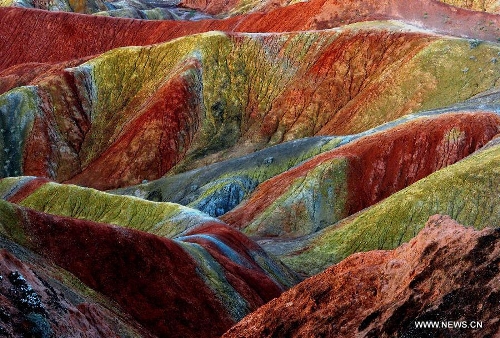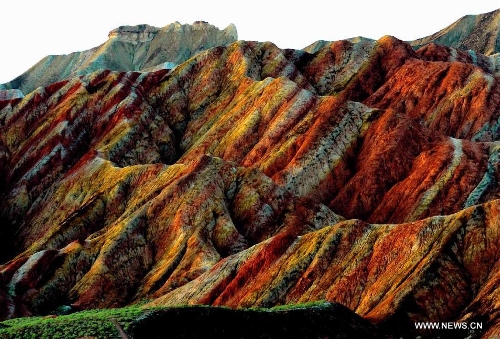Danxia Scenic Area in NW China

Tourists view the scenery of Danxia landform at the Danxia Scenic Area in Zhangye City, northwest China's Gansu Province, July 27, 2013. Danxia, which means "rosy cloud", is a special landform formed from reddish sandstone that has been eroded over time into a series of mountains surrounded by curvaceous cliffs and many unusual rock formations. (Xinhua/Wang Song)

Photo taken on July 27, 2013 shows the scenery at the Danxia Scenic Area in Zhangye City, northwest China's Gansu Province. Danxia, which means "rosy cloud", is a special landform formed from reddish sandstone that has been eroded over time into a series of mountains surrounded by curvaceous cliffs and many unusual rock formations. (Xinhua/Wang Song)

Photo taken on July 27, 2013 shows a chain of colorful undulating hills at the Danxia Scenic Area in Zhangye City, northwest China's Gansu Province. Danxia, which means "rosy cloud", is a special landform formed from reddish sandstone that has been eroded over time into a series of mountains surrounded by curvaceous cliffs and many unusual rock formations. (Xinhua/Wang Song)

Photo taken on July 27, 2013 shows the scenery at the Danxia Scenic Area in Zhangye City, northwest China's Gansu Province. Danxia, which means "rosy cloud", is a special landform formed from reddish sandstone that has been eroded over time into a series of mountains surrounded by curvaceous cliffs and many unusual rock formations. (Xinhua/Wang Song)

Photo taken on July 27, 2013 shows the scenery at the Danxia Scenic Area in Zhangye City, northwest China's Gansu Province. Danxia, which means "rosy cloud", is a special landform formed from reddish sandstone that has been eroded over time into a series of mountains surrounded by curvaceous cliffs and many unusual rock formations. (Xinhua/Wang Song)

Photo taken on July 27, 2013 shows the scenery at the Danxia Scenic Area in Zhangye City, northwest China's Gansu Province. Danxia, which means "rosy cloud", is a special landform formed from reddish sandstone that has been eroded over time into a series of mountains surrounded by curvaceous cliffs and many unusual rock formations. (Xinhua/Wang Song)

Photo taken on July 27, 2013 shows the scenery at the Danxia Scenic Area in Zhangye City, northwest China's Gansu Province. Danxia, which means "rosy cloud", is a special landform formed from reddish sandstone that has been eroded over time into a series of mountains surrounded by curvaceous cliffs and many unusual rock formations. (Xinhua/Wang Song)

Photo taken on July 27, 2013 shows a Hui-style building at the Danxia Scenic Area in Zhangye City, northwest China's Gansu Province. Danxia, which means "rosy cloud", is a special landform formed from reddish sandstone that has been eroded over time into a series of mountains surrounded by curvaceous cliffs and many unusual rock formations. (Xinhua/Wang Song)

Photo taken on July 27, 2013 shows the scenery at the Danxia Scenic Area in Zhangye City, northwest China's Gansu Province. Danxia, which means "rosy cloud", is a special landform formed from reddish sandstone that has been eroded over time into a series of mountains surrounded by curvaceous cliffs and many unusual rock formations. (Xinhua/Wang Song)

Tourists view the scenery of Danxia landform at the Danxia Scenic Area in Zhangye City, northwest China's Gansu Province, July 27, 2013. Danxia, which means "rosy cloud", is a special landform formed from reddish sandstone that has been eroded over time into a series of mountains surrounded by curvaceous cliffs and many unusual rock formations. (Xinhua/Wang Song)

Photo taken on July 27, 2013 shows the scenery at the Danxia Scenic Area in Zhangye City, northwest China's Gansu Province. Danxia, which means "rosy cloud", is a special landform formed from reddish sandstone that has been eroded over time into a series of mountains surrounded by curvaceous cliffs and many unusual rock formations. (Xinhua/Wang Song)